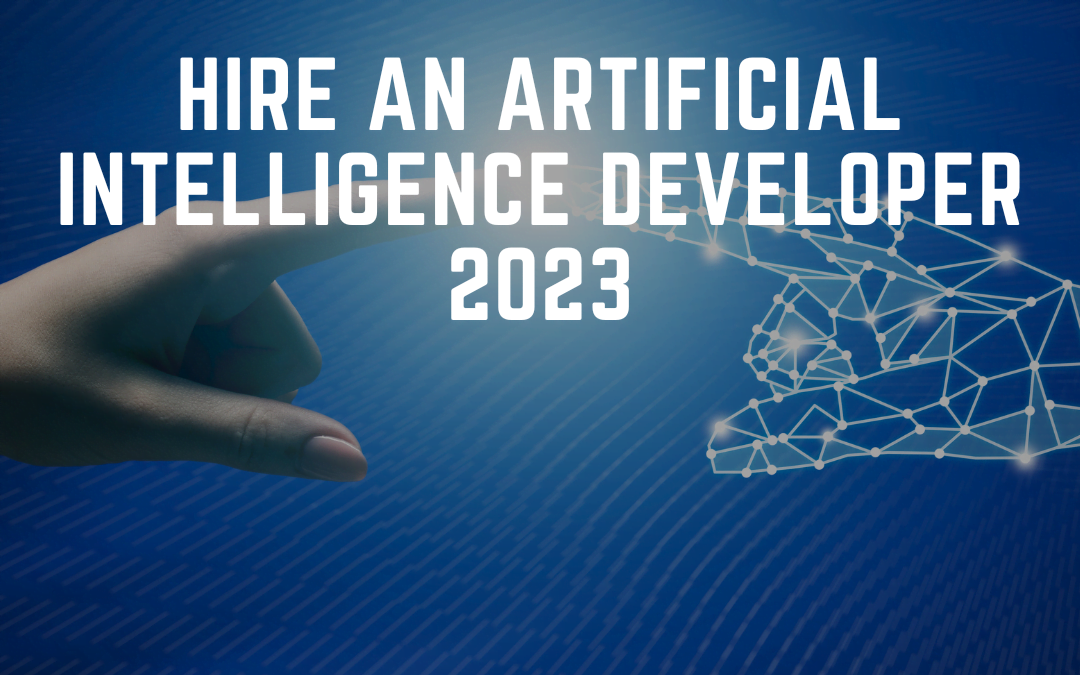If you’re looking to hire an Artificial Intelligence I developer for your team or company but aren’t sure where to begin, we have you covered. In this guide we’ll cover everything from the job market to salary expectations so that you can hire the perfect AI developer for your needs and budget!
We’ll start by taking a look at what artificial intelligence is and how it’s different from machine learning. We’ll also go over what kinds of jobs are available in the field today and how well they pay, including required skill sets.
Next we’ll discuss the industry’s growth and how it is impacting the demand for hiring AI developers. We’ll also look at what skills are in high demand and which should be avoided so that you can hire a developer that knows what they’re doing!
Finally, we’ll cover the top companies hiring AI developers in 2023 and give you some tips on how to make your company a place where they want to work.
So, let’s get started!
What is Artificial Intelligence?
Artificial Intelligence refers to computer systems capable of performing tasks commonly attributed to human intelligence. Two of the most well-known forms of artificial intelligence are machine learning and deep learning. While some use the terms interchangeably, they are actually two kind of AI that work differently from each other.
Machine Learning : Machine Learning uses algorithms to learn patterns and improve its performance over time. This means that unlike Deep Learning (see below), machine learning does not require vast amounts of data or a lot of processing power. It also means that it can be used for tasks like image recognition, natural language processing and predictive modeling.
: Machine Learning uses algorithms to learn patterns and improve its performance over time. This means that unlike Deep Learning (see below), machine learning does not require vast amounts of data or a lot of processing power. It also means that it can be used for tasks like image recognition, natural language processing and predictive modeling. Deep Learning: Deep Learning uses a neural network to learn and improve its performance over time. These networks use weighted connections between multiple output units to “forget” what they were told and generate new information. Deep learning is currently being used to create self-driving cars, while machine learning is currently being used to create “voice assistants”.
The Difference Between Artificial Intelligence and Machine Learning
As we mentioned above, machine learning uses algorithms to access data and learn patterns over time. However, this does not mean that it is smart enough to make a decision by itself. In fact, machine learning requires human input in order to make decisions. This can be done through machine-readable rules or by letting people tag the data so that the algorithms can learn from it. In both scenarios, humans are able to monitor the system’s performance and control its actions.
Whereas deep learning is an AI technique in which neural networks are trained to obtain a specific result. For example, it can be used to recognize gender, or to detect skin cancer. Deep learning is an effective way of bringing previously man-made systems into the real world (e.g., self-driving cars).
In general, deep learning systems make decisions based on past data and present circumstances. Using neural networks, data is fed into the system and then stored in the network’s memory. As more data is added to the system, it will learn and improve. However, as with any machine learning technique, it only works if there is enough data to train on.
Today Deep Learning AI systems are being used in everything from self-driving cars to facial recognition technology. Some experts have even predicted that deep learning will overtake machine learning by 2026. It is also clear that the demand for artificial intelligence is not plateauing anytime soon.
AI Development Job Market
According to Indeed, the job market for hiring artificial intelligence developers has grown 59% over the past year. At the same time, it’s become more competitive with job postings increasing 22%. That’s because businesses are becoming increasingly aware of the benefits of AI and how it can help them make better decisions. The BLS estimates that AI developers will see a 19% growth in jobs between 2016 and 2026.
The demand to hire AI developers is global, and the skills needed to do well in this field vary by industry. For example, artificial intelligence developers will have a significantly higher chance of finding work in the Technology Industries than the healthcare industry. It’s also worth noting that AI developers are in high demand because they help businesses optimize their processes, create smarter software and develop innovative products.
Artificial intelligence developers should also be familiar with machine learning, as it is commonly used to train deep learning solutions. While machine learning is currently used by companies to improve their technologies, artificial intelligence developers are still needed to create and maintain these systems. We’ll go into more detail on the demand for hiring AI developers later in this guide!
What Are Some Top Job Titles for AI Developers?
The job market for artificial intelligence developers is expected to grow by 19% between 2016 and 2026. This will be primarily driven by the demand among technology industries such as those in the Manufacturing, Information Technology, and Scientific Research & Development industry groups.
Employment for AI developers is expected to grow fastest in the following occupations:
Machine Vision Specialists (Intelligent Systems Designers, Object and Environment Localization)
(Intelligent Systems Designers, Object and Environment Localization) Software Development Engineers (Information Security Engineers, Software Quality Assurance Engineers, Mobile Application Developers)
(Information Security Engineers, Software Quality Assurance Engineers, Mobile Application Developers) Artificial Intelligence Researchers (Computer Vision Researchers, Data Analysts for Machine Learning/Knowledge Processing).

